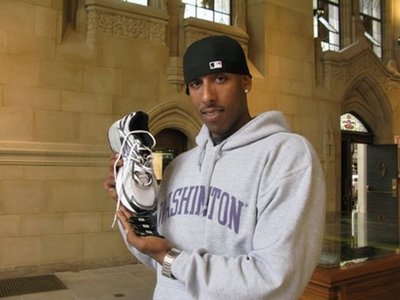May 13, 2010
Hundreds of projects to be showcased at annual Undergraduate Research Symposium
Nearly 750 of the UW’s most talented and accomplished undergraduates will showcase their contributions to innovative and groundbreaking research at the Thirteenth Annual Undergraduate Research Symposium from noon to 5 p.m. Friday, May 21, in Mary Gates Commons. The symposium is organized by UW’s Undergraduate Research Program, which facilitates research experiences for students in all academic disciplines.
With topics ranging from alternative energy to materials science to the performing arts, undergraduate research at the UW has truly taken 21st century education out of the classroom and into the field. Working with faculty mentors and benefitting from the University’s resources as a research powerhouse, undergraduates can fully engage with a meaningful issue or problem within their discipline.
At the symposium, undergraduates present what they have learned through their research to a larger audience. For example, Daniel Kore, a senior in political science and informatics, will present his research in designing a “smart” running shoe that reduces the likelihood of injury through microprocessors and data analysis.
In high school, Kore was an accomplished runner whose career was cut short due to injury. His research included interviewing runners, coaches, and running shoe companies to learn the most prevalent types of injury and what is currently being done to address them. He has pulled together that information and designed a high-fidelity proto-type of a running shoe. Kore will present his research in the second poster session.
Sherry Lee, a senior in biology who is also a Mary Gates Research Scholar and Levinson Scholar is researching Merkel cell carcinoma, a rare but aggressive skin cancer associated with immune suppression. Lee will present “Merkel cell carcinoma: Genome-wide studies identify Merkel cell polymavirus-dependent and –independent paths to Rb inactivation and a novel virus-encoded microRNA” in the oral session “Models for Human Disease.”
“Undergraduate research has complemented my lecture-based education at the UW,” wrote Lee in an e-mail. “Encountering and overcoming obstacles has taught me key steps of the scientific process that textbooks did not provide.”
In addition to Kore and Lee, students from all three UW campuses as well as students from other Washington four-year and community colleges will share their work through poster and oral presentations, encouraging interdisciplinary discourse and allowing students to learn from each other about a broad range of innovative research arenas. To accommodate the number of students interested in presenting their research, the symposium will have two distinct oral and poster sessions.
Of particular note this year is a collaboration between undergraduate engineering students in a Freshman Interest Group at the UW and undergraduate engineering students at Tohoku University in Japan. The Japanese students will visit the UW and, with their UW student collaborators, present their research projects in materials science, water purification, semiconductors and other topics in a joint oral presentation session. Professor Raj Bordia has mentored students participating in this unique collaboration.
In addition, a performance session, “New Perspectives in Performance Studies,” will be held in Meany Studio from 1-2:30 p.m.
Ed Taylor, dean of undergraduate academic affairs; and Dan Evans, former Washington governor and regent; will speak at the beginning of the symposium. At that time, Research Mentor Awards will be presented to some of the faculty who worked with the students. The award winners, chosen by vote of the student researchers, are Keiko Torii, biology; Ram Samudrala, microbiology; Stephen Hinds, classics; Sapna Cheryan, psychology; Joachim Voss, nursing; and Elizabeth Skovran, chemical engineering.
Beginning May 14, Symposium attendees can search the online proceedings, locate the oral and presentation sessions that interest them, and create their own, personalized proceedings to navigate the Symposium. Visit here to use this tool.
Following are a few examples of the 39 concurrent oral presentation sessions. Though one student is noted in the sessions below, 5-9 students present their research in each session, some presentations are group presentations, and each session is moderated by a faculty member.
Collaboration between UW and Tohoku University Undergraduate Engineers
Chen Shi, sophomore, bioengineering
Oral presentation topic: Clean Water: Study of Nutrient and Pharmaceutical Absorption by Scenedesmus obliquus
Mentor: Professor Raj Bordia, materials science and engineering
Session Moderator: Professor Raj Bordia, materials science and engineering
Chemistry and Materials for Alternative Energy Applications
Noah Horwitz, senior, chemistry
Oral presentation topic: Built-in Field Characterization of Self-Assembled Monolayers in Organic Photovoltaics
Mentor: Associate Professor David Ginger, chemistry
Session Moderator: Jennifer Chen, post-doc, chemistry
Social and Cultural Geographies of the Seattle Region
Shaylee Suitts, senior, anthropology
Oral presentation topic: ‘Buying In’ to Middle Class: A Study of Contemporary Material Standards of Living in Seattle
Mentor: Jason De Leon, full-time lecturer, anthropology
Session Moderator: Associate Professor Sarah Elwood, geography
Global Issues for the 21st Century
Charmila Ajmera, senior, international studies, and fellow members of task force researching this topic. Thirteen students comprised the task force.
Oral presentation topic: Next Steps for the US in Afghanistan
Mentor: Anand Yang, director, Jackson School of International Studies
Session Moderator: Associate Professor John Wilkerson, political science
New Perspectives in Performance Studies
Alethea Alexander, junior, dance and environmental studies
Performance presentation topic: Reliving Modern Dance History in the Seattle and Global Communities
Mentor: Professor Hannah Wiley, dance
Session Moderator: Associate Professor Betsy Cooper, dance
The Undergraduate Research Symposium is free and open to the public.

